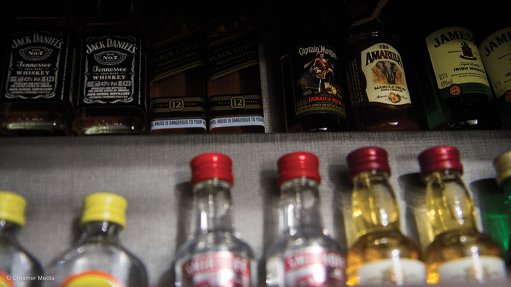
RESPONSIBLE USE
Companies need to ensure that employees do not abuse alcohol
Photo by: Duane Daws
There is a need for high-risk industries, such as those in the materials handling and logistics sector, to have proper policies in place regarding alcohol consumption, as this would likely decrease the company’s fatality rate, says alcohol testing equipment supplier Alco-Safe director Rhys Evans.
“Companies need to employ a zero tolerance policy, which stipulates that no individual may enter the premises under the influence of alcohol, as alcohol- and drug- related incidents can cause injuries or even death, while there is also the risk of loss of or damage to property.”
He points out that some of the companies that Alco-Safe has worked with have had major incidents. A notable example was a crane operator losing control and causing the crane to swing into a public transport vehicle.
Another incident occurred in the warehouse of a client in the logistics industry, “where a forklift operator was under the influence of alcohol and drugs, which caused him to drive through a drywall, knocking it over and killing an individual on the other side of the wall”, notes Evans.
He points out that such incidents vary in degree of severity, but that they have one aspect in common – they could have been prevented if proper testing and substance policies had been in place.
Alco-Safe provides for the installation of measuring services at various locations at a business to monitor employees’ alcohol levels using breathalysers. The company measures alcohol levels for a set period, which can be used to compare levels of alcohol abuse, which have been found to be as high as 30% or higher among workers in companies that are having trouble with alcohol abuse.
He adds that, once the systems from Alco-Safe are implemented, alcohol abuse can drop to between just 2% and 3% but the problem is not always eradicated and further measures need to be taken, including disciplining or removing repeat offenders.
Evans highlights the importance of companies in all industries doing regular testing, preferably on a daily basis. “While this seems like a time-consuming endeavour, there are devices that assist in accelerating the process, with up to 15 people being tested a minute using one device.”
He believes that testing will be more effective if introduced as part of the daily check-in process, thereby reducing risk.
“Enforcing alcohol-control policies and following up with consequences for employees for alcohol and substance abuse are also important,” he stresses.
If there are instances where serving alcohol is unavoidable, such as during functions, Evans advises that companies ensure that staff are aware that the onus is on them to drink responsibly and remain within legal limits of alcohol consumption.
“Companies also need to ensure that measures are taken to prevent access to dangerous areas or equipment during the function, but that employees are aware of the dangers and consequences, where access cannot be completely avoided, prior to the function.”
To improve the way alcohol abuse is handled, organisations can ensure that they have the right policies in place and educate staff about the effects and consequences of such abuse, Evans explains.
“Alco-Safe provides pamphlets that explain the effects of alcohol and drug abuse, which are often useful in preventing such abuse. Should an individual test positive for alcohol, we encourage the organisation to not immediately arrange for a dismissal, but to first identify if it is an ongoing problem or a one-off occurrence.”
He concludes that, if an employee does abuse alcohol, employers should first try to help the employee, either by providing guidance through outside intervention or by providing guidance themselves.